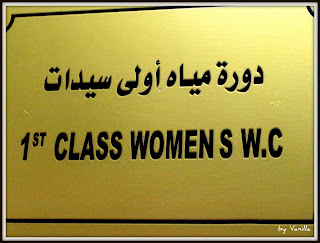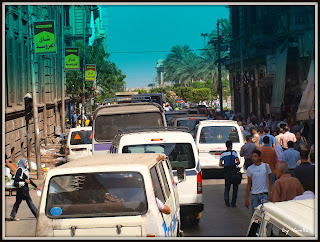 |
| The Pyramid of Chephren (Khafre) at Giza. [Link] |
This post explains my 2-week hiatus.
My visit to
Egypt was brief, barely sufficient to scratch the thinnest surface of the 3-millennium
Ancient Egypt civilization. It is not my intention to turn this post into a travelogue. Rather, I thought I could share some
(hopefully useful) information with those who are contemplating a similar visit.
Egypt
To the local people, Egypt is Misr, the romanized Arabic name for the country. It is located in the northern African Continent with five millennia of history, culture and tradition.
(map)
Currency
The local currency is the Egyptian Pound (EGP) which is about US$0.20. However, USD is also widely accepted. Just convert some of your USD into EGP at the airport. You can change on the go at the banks, money changers or retail outlets (when you make purchases). The exchange rates rarely vary at these places. Always keep with you lots of loose change. You would need it for loo visits and tipping.
 |
| Blazing Sun - Sphinx Temples at Giza [Link] |
Weather
Every adjective I know just seems too mild to describe the desert heat. Let's just simply say it is 'hot'. The temperature in Egypt is very capable of going beyond 40°C (104°F) during the hot season (May-Oct). The blazing sun can be punishing for the unprepared and the cloudless sky is surely not being helpful. Be prepared for the inescapable heat. Hats, shades and sunblock are essential. You may also want to bring along thin shawls or umbrellas for added protection. If you do not mind a little more trouble, bring along a water spray or hand-held fan.
 |
You need plenty of water
to beat the desert heat (Giza Desert) [Link] |
Drinking Water
Tap water is not potable in Egypt. You can get bottled water easily and you would need lots of water to fight the blazing desert heat.
 |
Toilet sign at the Luxor Train Station,
meant for passengers of 1st class cabins. [Link] |
Toilets
Public toilets are of average hygiene standards and they are easily available, especially at tourist spots. Be prepared to pay one or two Egyptian Pounds (about US$0.20-US$0.40) for the use of public toilets. Most of them do not come with toilet paper. Bring along your own.
Attire
Light clothing is highly recommended. If you are traveling during the cool season (Nov - Apr), bring something extra for the cooler evening. Special notes for ladies: Egypt is a Muslim country. Show some respect to the local people and do not walk around baring too much. This is especially so if the ladies are planning to visit the mosques. A shawl can be handy for such visits. For footwear, use a pair of reliable walking shoes and avoid flip-flops.
 |
| Major road signs are in English as well. [Link] |
Language Used
Arabic is the main language. However, most people in the cities can manage simple English. Signages are in Arabic but major ones would include English.
 |
It is common to be subject to security screening,
even when aboard the River Nile Cruise. [Link] |
Security
Almost every tourist spot is equipped with security screening. It may seem that security is tight. Not quite. More often than not, you would be perfunctorily asked to walk through the scanner. Almost everyone sets the beep off and almost no one is being stopped for further checks. These screening gates somehow seem redundant. In some places, you would even be subject to airport-like bag and body screening. The only difference is that no one seems to care about what shows up on the display screen.
While security is generally not of great concern, I am not suggesting carefree wondering at all times. Commonsense prevails when come to such matters. By the way, pickpocketing is not uncommon.
 |
| Tourism Police stationed at major tourist places. [Link] |
Tourism Police
This is an arm of the Egyptian Police Force. As the name suggests, the Tourism Police is set up to support the thriving Egyptian tourism industry. They are everywhere but their presence does not necessarily add much helpfulness to the tourists. Most cannot manage English well and communication can be a problem. They are not usually friendly and most are rather imposing. To me, they add more intimidation rather then a sense of security.
 |
| Messy jam is a common sight (Alexandria) [Link] |
Traffic Jam
Theirs is not the worst in the world but bad enough. Major cities such as
Cairo (Capital) and Alexandria (northern coastal city) are plagued with road congestion. In Cairo, 6 million daily commuters travel in and out of the city and traffic during weekday rush hours
(Sunday is a working day) can be quite paralyzing. Give yourself ample time to get to your destination, especially if you are catching a flight.
Jay-Walking
The pedestrians share the streets with motorists 'harmoniously'. Whilst the vehicles crawl slowly and messily in one direction, the pedestrians walk within the same space in all directions. I do not recall seeing any zebra-crossing and not that anyone there is going to respect the rules.
Honking
They honk and they honk a lot. It is just their way of life. Honking is not necessarily an act of hostility or rudeness. It is also not always used as a way to warn. Oftentimes, divers honk to 'gently' nudge fellow drivers to be careful. They also honk to 'greet' each other. Interestingly, the 'honking' (or rather 'tooting') culture is also extended to the cruises on the River Nile.
 |
Egyptian bread made with wheat,
common food for the local people. [Link] |
Food and Beverages
Egypt is a Muslim country and the local people observe the necessary dietary restrictions. Be sensible if you intend to bring food items into the country. While you do not expect pork to be served, beer is rather easily available.
Bargaining
There are many marketplaces in Egypt where the locals get their basic supplies. In Cairo, you can find Egyptian souvenirs at the huge
Khan el-Khalili marketplace. The labyrinth of narrow alleys are lined with stalls and tiny shops. They sell almost the same stuff such as glass water pipes, shawls, colorful spices, jewelry and leather products.
As you zip through the alleys, every vendor will be 'greeting' you with their ceaseless chant of "one dollar, one dollar" as if everything there is going at US$1.00. If something catches your eyes, ask for the price more specifically. Usually, it is anything but 'one dollar'. Have in mind a price and start haggling. Always pay with an exact amount if you have. If you need to pay with a bigger note, ask if the vendors have the change. Otherwise, you may be persuaded to buy a little more with the excuse that change is not available. In the event that the deal fails, walk away firmly.
If you are not interested, do no stop and browse or touch. Your tentative showing of interest will be construed as a keen offer to buy. Even if you walk away, the vendors may follow you and continue to counter-offer.
Do not engage in casual conversation with the vendors no matter how friendly they may seem. Do not even make any eye contact.
 |
| A little kid selling cheap souvenirs (Aswan) [Link] |
Begging and Touting
Some kids you meet on the streets might be used to asking for money from tourists. They would readily throw you their best smiles and be most cooperative if you wish to take a picture of them. That would usually be followed by persistent begging for some tips, usually "one dollar". It would be handy to bring along some little knick-knacks and candies. Give these to them instead.
Sellers of cheap souvenirs are capable of harassing you like irritating flies. They usually appear in the vicinity of tourist spots. If you buy a little something from one, the others may just swamp to you. No flyswatter can ever help you out.
Your visit to Egypt will not be complete without this. The 6650 km
River Nile is the longest in the world. It originates from Tanzania and cuts through African countries such as Uganda and Sudan before empties into the Mediterranean Sea from Egypt. The cruise would typically be 3 to 7 days with several stopovers for sightseeing. Most cruises are equipped with facilities for comfort and the cabins are as spacious as typical 3-5 star hotel rooms, with attached bath, TV and bar fridge. Due to varying water levels, the vessel may have to go through water locks. Make sure you get to witness it to complete your cruising experience.
 |
No photography is allowed inside
the Abu Simbel Temples. [Link] |
Photography
Do not assume photography is allowed at all tourist places. Find out first and respect their rules. For instance, no photography is allowed inside the
Valley of the Kings (Luxor, 635 km south of Cairo) and the
Abu Simbel Temples (Southern Egypt near the Sudanese border). At the
Aswan High Dam (about 1000 km south of Cairo), videography is not allowed. While photography is allowed at the dam, you must not use the zoom function
(I suggest you do not even try). The unusually tight security at the dam is due to the presence of military base in the vicinity.
If you wish to take pictures of or with the local people, it is better to ask for permission first. It is almost certain that you will be asked to pay some tips for their 'effort'.
 |
| "Self portrait" on desert sand. [Link] |
Read Up
Finally, Egypt is not just about the pyramids. While you do not have to chew 5,000 years of history before your departure, you will find your visit more rewarding if you understand the general flow of historical events.
I hope this 'gift' from Egypt will be of some use to you one day.
More pictures taken during the trip. (Photo Album)



























